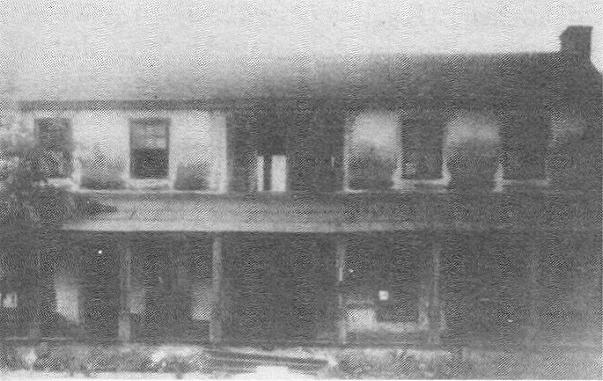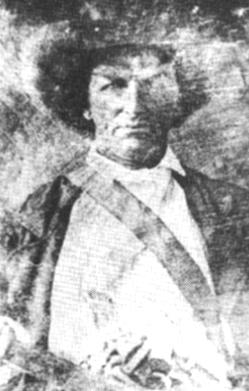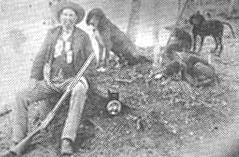SONS OF DEWITT COLONY TEXAS
According to son-in-law Robert Hall in his memoirs, Life of Robert Hall, John Gladden King originally came to Texas with the Gutierrez-McGee Expedition and was present at the Battle of Medina before he settled near Gonzales on his sitio land grant in 1830 on Soul Creek on the northeast bank of the Guadalupe River in current Guadalupe County. Hall in his memoirs related the following anecdote about his father-in-law:
According to descendants, Col. King was a friendly bear of a man with solid white hair and a paunch who spoke Spanish fluently and communicated well with many Texas Indians who respected him highly. Son-in-law Robert Hall related that once a band of Lipan Apaches arrived near the King Ranch and the grieved Lipan chief Francisco, who communicated with Col. King in Spanish, brought the body of his wife to John King for a Christian burial. The colonel with twenty braves alongside the grave and the chief at the foot presided as blacks lowered the body.
John Gladden King Sr. (February 8, 1790 South Carolina-March 15, 1856) married May 8, 1817 or April 7, 1818 Parmelia "Millie" Parchman (March 8, 1798 Tennessee-March 24, 1879) by Reverend Hicks in Pulaski, Giles County, Tennessee. Parmelia was the daughter of a British subject who had settled in Pennsylvania. They were buried in the King Cemetery near Oak Forest, Gonzales County alongside many of their descendants. The Kings arrived in DeWitt's Colony May 15, 1830 with seven children and received "Titles, DeWitt's Contract" Number 27-30 for one sitio of land April 24, 1831. Mrs. King's sister Elizabeth Dilworth and son Powhatan Dilworth joined her around 1838. She had married a widower John E. Foster who died in Mississippi. She later married Doctor Hardeman. A brother James Parchman joined them and his estate and home at Belmont near the county line was settled in 1858. It was then known as the "King House" as two King nephews James Parchman King and Thomas D. King owned it subsequently. John and Millie had four sons William Philip, John G. Jr., Thomas D. and James Parchman and seven daughters Nancy Gladden, Elizabeth, Mary Minerva, Matilda Briggs, Zillah Parmelia, twins Eliza Ann and Ann Eliza. William Philip King (October 8,1820-March 6, 1836) died at the Alamo after choosing to take his father's place with the thirty-two men from Gonzales who answered Travis' call. His parents received Donation Certificate 753 for 640 acres for his service but they did not keep it or accept any money for it. It was sold to a Mr. Wallingford as payment for his teaching school for two years. John G. King Jr. (January 30, 1825) joined Hays' Rangers in 1842 under H.E. McCulloch and served until after Salado. He married Elizabeth Coratine Tom August 10, 1848 or July 10, 1849 by Louis Hipp, justice of the peace. Thomas D. King (February 26,1829 Louisiana-September 16, 1873) married August 10, 1854 Mary Parchman Harris (July 12, 1835 Monroe County, Mississippi – January 13, 1905), daughter of Thomas and Nancy Harris, the granddaughter of Archey Alexander pioneer of Tennessee and Mississippi. On December 28, 1904 before her death, she declared Mary P. Harris and Nellie King to be her granddaughters and sole surviving heirs. They were the daughters of her only child Tom H. King (August 20, 1855-November 4, 1895) who married December 27,1877 Inez Speer (July 25,1858 Mississippi-February 18,1902) the daughter of J.C. and Amanda Speer. Their two children were Nellie (July 31, 1881-February 11, 1923) who married Charles A. Burriss August 16, 1905 and Mary P. King who married Allan Alexander Harris. James Parchman King (February 18, 1835-January 24, 1868) was united in marriage January 26, 1859 with Martha A. Morrison (December 8, 1840). He served as a captain in the Confederacy and their three children were: John Wesley King (April 11, 1861 August 28, 1864); James Caldwell King (November 22, 1859-1926 Padre Island) was the last of the King name; Milly Almeda (July 30, 1867) married Jim Towns. The oldest of the King daughters Nancy Gladden King (January 19, 1818) married first Benjamin Fuqua then on May 20, 1838 married William A. Matthews and had two children Marion Matthews (November 16, 1840) and an infant James A. who died at the age of thirteen months. The second daughter Elizabeth died March, 1822 at the age of six months. Mary Minerva "Polly" (February 13, 1819) married Robert Hall Sr. Matilda Briggs King (June 10, 1823-January 15, 1853) married July 25, 1841 James Thomas Foster (March 3, 1818-November 10, 1870) and had John W. (October 26,1844) and Nancy Caroline (December 17, 1846). Zillah Parmelia (November 11, 1826) married Alsey S. Miller. Twin Ann Eliza (June 18, 1832) died at the age of one year and three days. Twin Eliza Ann (June 18, 1832-February 25, 1881) married first T.R. Rutledge (February 11, 1817-January 10, 1850 Helena, Arkansas) and had an infant who died January 27, 1847 or August 1, 1847; William M. Rutledge who died July 14,1854; and Eliza Ann Rutledge (July 23,1848). Eliza Ann King Rutledge married second July 2, 1850 William London Foster (1828 Calloway County, Kentucky), the eldest child of John E. and Mary Moore Foster of Alabama and had eight children: James Chisim (October 12, 1875-December 2, 1934) lived on his father's farm; Mary (May 16, 1858-died as infant); Parmelia E. (June 9, 1853-July 19, 1854); Thomas Pinckney Foster (November 1, 1865-October 6, 1869); John King a dentist at Eagle Pass, Texas; Philip Houston a dentist at Marion, Texas; William Lee managed the family farm; and Minnie Alice married N. Morrison of Leesville. Colonel John G. King contributed early to the cattle
industry as indicated by the brand "JG" registered in 1831. After the fall of
the Alamo he moved his family temporarily to Montgomery County, but made frequent trips
back to his fort on the Guadalupe to see about his fine plantation and his horses. He
effected a treaty of peace between the Tonkawa Indians and Captain Matthew Caldwell and
ordered beeves killed to feed the Indians which resulted in a lasting friendship with the
Indians who regarded him highly. He was described as colorful [Image from Caddel's article, History of Gonzales County, captioned "King House Stagecoach stop, built prior to 1858. The King family and descendants were known for their hospitality and innkeeping tradition through the late 19th century. They were known far and wide as related by son-in-law Hall and in other regional memoirs for their large number of beautiful daughters. It is probably a King family run house referred to as King's Inn on the Guadalupe River in Ferdinand Roemer's book, "Texas" where he spent two nights in 1846, and in the author's uncle Nathan Boone Burket's memoirs-WLM] Description--Comanche Raid
on Linnville & Battle of Plum Creek > When game became scarce Robert Hall's family moved from South Carolina in 1828 to the new District of Tennessee. They had the first house built by whites on the Choctaw Bluffs in Memphis at the mouth of Wolf Creek. Then they settled on the Rutherford fork of the Obion River in Gibson County. He placed his first vote for Davy Crockett in McLemoreville, illegally, when he was eighteen. Robert worked aboard a flat boat and got off at New Madrid to work on a steamboat named H.M. Shrieve and then to the Hibernia. The next year, he built a flat boat in Tennessee and freighted it with corn and floated near Yazoo City where he sold cargo and craft. In 1834 Hall was employed by a Lake Tula, Mississippi planter, Charles McGee to oversee his plantation. He enlisted at Natchez with Captain Earl's company, commanded by Colonel Harrison of Kentucky and was enrolling officer in New Orleans. They reshipped on an old side-wheeler, the George Washington, bound for the Red River. He joined the Texas Army at Camp Johnston commanded by Albert Sidney Johnston. Weakened by dysentery he obtained a discharge and started out for Mississippi in the fall of 1836. He left with a carved, ivory powderhorn with the Spanish inscription "El Pirita" on it. He told that it was a present from LaFitte to Jane Long who gave it to Sam Houston who presented it to Hall. Robert Hall settled in Montgomery County and made a crop on the Clark plantation and married in 1837. That fall he took his first corn to Houston which consisted of three houses. Later that fall they moved back to Gonzales and in 1838 made a fine crop. Rangers banded together to buy forty-four shares in Seguin. His cabin, the first in Seguin, was at the corner of Travis and Market (Nolte) Streets and in 1984 was the home of Lynn Glenewinkle, the photographer. The 1850 census found him with his family on Sandies Creek in Gonzales County. He and Polly were on the Guadalupe in 1860 with ten children. He spent three years in the Confederacy and settled later at Indian Bend on the Nueces River at Rock Crossing between Carrizo Springs and Cotulla, Texas. After his wife died Robert made his home in Cotulla.
Hall relates the love story between him and wife, King daughter Mary Minerva (Polly) King and respect for his father-in-law, John King as follows:
Children: The thirteen children of the Halls were: William Gassaway (March 3, 1838 - March 1838); Elizabeth (February 9, 1839 February 6, 1844); James Martin (September 22, 184 - December 22, 1863); Simeon G. (September 27, 1842 - March 25, 1862); Parmelia Rebecca (December 29, 1844) married S.M. Childers November 10, 1863; Lucy Story (November 15, 1846 -August 15, 1881) married December 15, 1861 Curtis Herring (August 2, 1834 Kinston, North Carolina - July 30, 1903) descendant of Palatines and Herron who migrated in the early 18th century; John Johnson (August 2, 1848 - February 19, 1905) married January 7,1875 in McMullen County Julia A. Trammel (December 10, 1848 -October 10, 1906), two of their grandchildren were John P. Hall and Maxine Hansen of San Antonio; Mary Minerva (May 21, 1850 - May 2, 1879) married March 16, 1878 Charles Sullivan, had a daughter Annie E. Sullivan (April 28, 1879); Robert Luther (July 6, 1852), was in the cattle business with his father, had a son, Bob Hall, who was sheriff of Dimmit County, two descendants were Lee Ann, who married R.V. Tocquigni of Carrizo Springs and Preston Gise of Cotulla; Thomas King (March 8, 1854) married the sister of Julia Ann (Mrs. Tom Hall) and Henry Trammell; Ann Eliza (June 10, 1856) married Julius Strobel February 9, 1875 and lived in Washington, D.C., their son who lived in Dallas prior to 1936 presented Robert Hall relics to the Texas Centennial; Narcisus King (February 5, 1859 - January 2, 1861); Benjamin Franklin (July 24, 1861 - September 15, 1869). Lucy and Curtis Herring were buried in the Tilden Cemetery, McMullen County. Their daughter, Lillie (March 1, 1872 -December, 1966) married May 19, 1887 Joseph Doty Caddel (July 23, 1857 - January, 1929) son of Andrew Bell Caddel (February 26, 1825 Alabama) and Susan Sparks (December 2, 1830 Alabama - April 8, 1878 Coryell County). J.D. Caddel, descendant of Andrew Caddel Jr. who emigrated from Scotland in the mid-eighteenth century, and his wife were buried in the Sinton Cemetery, San Patricio County. Their eldest son Joseph Curtis Caddel (March 20, 1895 Sinton) married August 12, 1926 Mary Josephine Beckcom (November 7, 1906 Bronson, Sabine County) the daughter of Paul Peabody and Marguerite Bernice Thomas Beckcom. The Beckcoms were descendants of James Davenport, Nathaniel Grigsby and William Beckeom of Virginia. An only child was Charlotte Yvonne (November 15,1928) who married December 27, 1967 Charles Elwood Ferguson Sr. (December 27, 1917) the son of Callie Myrtle Sherman and John David Ferguson, a descendant of Samuel Ferguson of Tennessee. Yvonne Caddel Ferguson (From The History of Gonzales County, Texas. Reprinted by permission of the Gonzales County Historical Commission). SONS OF DEWITT COLONY TEXAS |
 and picturesque as well as
a grand looking old man. Millie King operated an inn for travelers. Despite Colonel King's
participation in the War of 1812, Mrs. King was refused a widow's pension for his service
with Captain Mosely's Company of the Tennessee militia due to "no proof of
service." Colonel King was also refused payment for his participation in and
supplying the Texas Revolution. Yvonne Caddel Ferguson. (From The History of Gonzales County, Texas. Reprinted by
permission of the Gonzales County Historical Commission).
and picturesque as well as
a grand looking old man. Millie King operated an inn for travelers. Despite Colonel King's
participation in the War of 1812, Mrs. King was refused a widow's pension for his service
with Captain Mosely's Company of the Tennessee militia due to "no proof of
service." Colonel King was also refused payment for his participation in and
supplying the Texas Revolution. Yvonne Caddel Ferguson. (From The History of Gonzales County, Texas. Reprinted by
permission of the Gonzales County Historical Commission). [Summarized from Yvonne Caddel
Ferguson's article in The History of Gonzales County, Texas and
Robert Hall's memoirs, Life of Robert Hall. Verbatim passages reprinted by permission of
the Gonzales County Historical Commission]. Robert Hall
was a veteran of three wars, thrice wounded, took San Antonio three times, a
"Minuteman", farmer, rancher, Indian fighter, cavalryman, scout, husband,
father, and a proud member of
[Summarized from Yvonne Caddel
Ferguson's article in The History of Gonzales County, Texas and
Robert Hall's memoirs, Life of Robert Hall. Verbatim passages reprinted by permission of
the Gonzales County Historical Commission]. Robert Hall
was a veteran of three wars, thrice wounded, took San Antonio three times, a
"Minuteman", farmer, rancher, Indian fighter, cavalryman, scout, husband,
father, and a proud member of  In
later years, he frequently wore Indian suits which he had made and beaded. They were later
displayed in the Hall of State in Dallas along with the carved ivory powderhorn. A sword
he confiscated at Buena Vista plus his picture were in the Nogales Museum in Seguin. The
Life of Robert Hall by Brazos (pseudonym) was published by Ben C. Jones and Company,
Printers, Austin, Texas in 1898. On June 20, 1837 in Montgomery County, Robert Hall
married Mary Minerva "Polly" King, daughter of
In
later years, he frequently wore Indian suits which he had made and beaded. They were later
displayed in the Hall of State in Dallas along with the carved ivory powderhorn. A sword
he confiscated at Buena Vista plus his picture were in the Nogales Museum in Seguin. The
Life of Robert Hall by Brazos (pseudonym) was published by Ben C. Jones and Company,
Printers, Austin, Texas in 1898. On June 20, 1837 in Montgomery County, Robert Hall
married Mary Minerva "Polly" King, daughter of